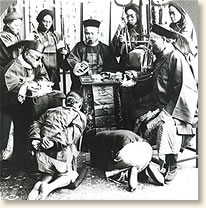In early 1900, Boxers in China's Northern provinces attacked and killed hundreds of Chinese Christians and foreign missionaries. The violence culminated on June 20, with the killing of the German Minister in Peking (Beijing). Most foreigners and many Chinese converts fled to the foreign legations in Peking and were promptly besieged by a large force of Boxers supported by Chinese imperial troops.
In the summer of 1900, the U.S. joined forces with Britain, France, Germany, Italy, Austro-Hungary, Japan and Russia in mounting what was termed the "China Relief Expedition". The objective of this multi-national force was to rescue the foreign nationals besieged by the Boxers.
America's recent acquisition of the Phillipines as a result of the Spanish-American War of 1898 had increased its interest in the Pacific and the Far-East. The country's involvement with the China Relief Expedition marked the first time since the American Revolution that the U.S. cooperated with a foreign power in a military operation.
The Relief Expedition, numbering about 19,000 troops including 2,500 American soldiers, stormed Peking in mid August, rescued the legations and forced the imperial court to flee the city. On September 7, 1901, China and 11 other nations signed the Boxer Protocol ending the uprising. The Protocol required China to pay an indemnity of $330,000,000 and gave the foreign powers certain territorial rights.


